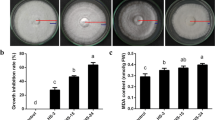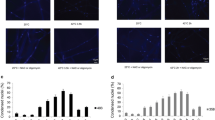Abstract
High temperature is a major threat to Pleurotus ostreatus cultivation. In this study, a potential mechanism by which P. ostreatus mycelia growth is inhibited under heat stress was explored. Lactate, as a microbial fermentation product, was found unexpectedly in the mycelia of P. ostreatus under heat stress, and the time-dependent accumulation and corresponding inhibitory effect of lactate on mycelial growth was further confirmed. The addition of a glycolysis inhibitor, 2-deoxy-d-glucose (2DG), reduced the lactate content in mycelia and slightly restored mycelial growth under high-temperature conditions, which indicated the accumulation of lactate can be inhibited by glycolysis inhibition. Further data revealed mitochondrial dysfunction under high-temperature conditions, with evidence of decreased oxygen consumption and adenosine triphosphate (ATP) synthesis and increased reactive oxygen species (ROS). The removal of ROS with ascorbic acid decreased the lactate content, and mycelial growth recovered to a certain extent, indicating lactate accumulation could be affected by the mitochondrial ROS. Moreover, metabolic data showed that glycolysis and the tricarboxylic acid cycle were enhanced. This study reported the accumulation of lactate in P. ostreatus mycelia under heat stress and the inhibitory effect of lactate on the growth of mycelia, which might provide further insights into the stress response mechanism of edible fungi.
Key Points • Lactate can accumulate in Pleurotus ostreatus mycelia under heat stress and inhibit its growth. • The accumulation of lactate may be due to the acceleration of glycolysis and the dysfunction of mitochondria of P. ostreatus mycelia under high-temperature stress. • The glycolysis and tricarboxylic acid cycle of P. ostreatus mycelia were accelerated under high-temperature stress. |






Similar content being viewed by others
References
Ali MA, Yasui F, Matsugo S, Konishi T (2000) The lactate-dependent enhancement of hydroxyl radical generation by the Fenton reaction. Free Radic Res 32:429–438. https://doi.org/10.1080/10715760000300431
Atlante A, de Bari L, Bobba A, Marra E, Passarella S (2007) Transport and metabolism of L-lactate occur in mitochondria from cerebellar granule cells and are modified in cells undergoing low potassium dependent apoptosis. BBA-Bioenergetics 1767:1285–1299. https://doi.org/10.1016/j.bbabio.2007.08.003
Banh S, Wiens L, Sotiri E, Treberg JR (2016) Mitochondrial reactive oxygen species production by fish muscle mitochondria: potential role in acute heat-induced oxidative stress. Comp Biochem Physiol B 191:99–107. https://doi.org/10.1016/j.cbpb.2015.10.001
Boone CHT, Grove RA, Adamcova D, Seravalli J, Adamec J (2017) Oxidative stress, metabolomics profiling, and mechanism of local anesthetic induced cell death in yeast. Redox Biol 12:139–149. https://doi.org/10.1016/j.redox.2017.01.025
Chen WC, Wei LL, Zhang Y, Shi DY, Ren WC, Zhang ZH, Wang J, Shao WY, Liu XL, Chen CJ, Gao QL (2019) Involvement of the two L-lactate dehydrogenase in development and pathogenicity in Fusarium graminearum. Curr Genet 65:591–605. https://doi.org/10.1007/s00294-018-0909-6
Chiao YA, Kolwicz SC, Basisty N, Gagnidze A, Zhang J, Gu HW, Djukovic D, Beyer RP, Raftery D, MacCoss M, Tian R, Rabinovitch PS (2016) Rapamycin transiently induces mitochondrial remodeling to reprogram energy metabolism in old hearts. Aging-US 8:314–326. https://doi.org/10.18632/aging.100881
Chow L, From A, Seaquist E (2010) Skeletal muscle insulin resistance: the interplay of local lipid excess and mitochondrial dysfunction. Metabolism 59:70–85. https://doi.org/10.1016/j.metabol.2009.07.009
Corbet C, Pinto A, Martherus R, de Jesus JPS, Polet F, Feron O (2016) Acidosis drives the reprogramming of fatty acid metabolism in cancer cells through changes in mitochondrial and histone acetylation. Cell Metab 24:311–323. https://doi.org/10.1016/j.cmet.2016.07.003
DeBerardinis RJ, Chandel NS (2016) Fundamentals of cancer metabolism. Sci Adv 2:UNSP e1600200. https://doi.org/10.1126/sciadv.1600200
Heiden MGV, Cantley LC, Thompson CB (2009) Understanding the Warburg effect: the metabolic requirements of cell proliferation. Science 324:1029–1033. https://doi.org/10.1126/science.1160809
Jha MK, Lee IK, Suk K (2016) Metabolic reprogramming by the pyruvate dehydrogenase kinase-lactic acid axis: linking metabolism and diverse neuropathophysiologies. Neurosci Biobehav R 68:1–19. https://doi.org/10.1016/j.neubiorev.2016.05.006
Kim SY, Choi JS, Park C, Jeong JW (2010) Ethyl pyruvate stabilizes hypoxia-inducible factor 1 alpha via stimulation of the TCA cycle. Cancer Lett 295:236–241. https://doi.org/10.1016/j.canlet.2010.03.006
Kong WW, Huang CY, Chen Q, Zou YJ, Zhang JX (2012) Nitric oxide alleviates heat stress-induced oxidative damage in Pleurotus eryngii var. tuoliensis. Fungal Genet Biol 49:15–20. https://doi.org/10.1016/j.fgb.2011.12.003
Lei M, Wu XL, Huang CY, Qiu ZH, Wang LN, Zhang RY, Zhang JX (2019) Trehalose induced by reactive oxygen species relieved the radial growth defects of Pleurotus ostreatus under heat stress. Appl Microbiol Biotechnol 103:5379–5390. https://doi.org/10.1007/s00253-019-09834-8
Liu R, Cao PF, Ren A, Wang SL, Yang T, Zhu T, Shi L, Zhu J, Jiang AL, Zhao MW (2018a) SA inhibits complex III activity to generate reactive oxygen species and thereby induces GA overproduction in Ganoderma lucidum. Redox Biol 16:388–400. https://doi.org/10.1016/j.redox.2018.03.018
Liu R, Zhang X, Ren A, Shi DK, Shi L, Zhu J, Yu HS, Zhao MW (2018b) Heat stress-induced reactive oxygen species participate in the regulation of HSP expression, hyphal branching and ganoderic acid biosynthesis in Ganoderma lucidum. Microbiol Res 209:43–54. https://doi.org/10.1016/j.micres.2018.02.006
Lockman KA, Baren JP, Pemberton CJ, Baghdadi H, Burgess KE, Plevris-Papaioannou N, Lee P, Howie F, Beckett G, Pryde A, Jaap AJ, Hayes PC, Filippi C, Plevris JN (2012) Oxidative stress rather than triglyceride accumulation is a determinant of mitochondrial dysfunction in in vitro models of hepatic cellular steatosis. Liver Int 32:1079–1092. https://doi.org/10.1111/j.1478-3231.2012.02775.x
Maas RHW, Springer J, Eggink G, Weusthuis RA (2008) Xylose metabolism in the fungus Rhizopus oryzae: effect of growth and respiration on L (+)-lactate production. J Ind Microbiol Biotechnol 35:569–578. https://doi.org/10.1007/s10295-008-0318-9
Mans R, Hassing E-J, Wijsman M, Giezekamp A, Pronk JT, Daran J-M, Maris AJAV (2017) A CRISPR/Cas9-based exploration into the elusive mechanism for lactate export in Saccharomyces cerevisiae. FEMS Yeast Res 17:fox085. https://doi.org/10.1093/femsyr/fox085
Miller FJ, Rosenfeldt FL, Zhang CF, Linnane AW, Nagley P (2003) Precise determination of mitochondrial DNA copy number in human skeletal and cardiac muscle by a PCR-based assay: lack of change of copy number with age. Nucleic Acids Res 31:61e–661e. https://doi.org/10.1093/nar/gng060
Mishra P, Chan DC (2016) Metabolic regulation of mitochondrial dynamics. J Cell Biol 212:379–387. https://doi.org/10.1083/jcb.201511036
Moussaieff A, Rouleau M, Kitsberg D, Cohen M, Levy G, Barasch D, Nemirovski A, Shen-Orr S, Laevsky I, Amit M, Bomze D, Elena-Herrmann B, Scherf T, Nissim-Rafinia M, Kempa S, Itskovitz-Eldor J, Meshorer E, Aberdam D, Nahmias Y (2015) Glycolysis-mediated changes in acetyl-coA and histone acetylation control the early differentiation of embryonic stem cells. Cell Metab 21:392–402. https://doi.org/10.1016/j.cmet.2015.02.002
Passarella S, Schurr A (2018) L-Lactate transport and metabolism in mitochondria of Hep G2 cells—the Cori cycle revisited. Front Oncol 8:120. https://doi.org/10.3389/fonc.2018.00120
Passarella S, Bari LD, Valenti D, Pizzuto R, Paventi G, Atlante A (2008) Mitochondria and L-lactate metabolism. FEBS Lett 582:3569–3576. https://doi.org/10.1016/j.febslet.2008.09.042
Paventi G, Pizzuto R, Chieppa G, Passarella S (2007) L-Lactate metabolism in potato tuber mitochondria. FEBS J 274:1459–1469. https://doi.org/10.1111/j.1742-4658.2007.05687.x
Pavlova NN, Thompson CB (2016) The emerging hallmarks of cancer metabolism. Cell Metab 23:27–47. https://doi.org/10.1016/j.cmet.2015.12.006
Pickles S, Vigie P, Youle RJ (2018) Mitophagy and quality control mechanisms in mitochondrial maintenance. Curr Biol 28:R170–R185. https://doi.org/10.1016/j.cub.2018.01.004
Pizzuto R, Paventi G, Porcile C, Sarnataro D, Daniele A, Passarella S (2012) L-Lactate metabolism in HEP G2 cell mitochondria due to the L-lactate dehydrogenase determines the occurrence of the lactate/pyruvate shuttle and the appearance of oxaloacetate, malate and citrate outside mitochondria. BBA-Bioenergetics 1817:1679–1690. https://doi.org/10.1016/j.bbabio.2012.05.010
Plecita-Hlavata L, Tauber J, Li M, Zhang H, Flockton AR, Pullamsetti SS, Chelladurai P, D’Alessandro A, El Kasmi KC, Jezek P, Stenmark KR (2016) Constitutive reprogramming of fibroblast mitochondrial metabolism in pulmonary hypertension. Am J Resp Cell Mol 55:47–57. https://doi.org/10.1165/rcmb.2015-0142OC
Qiu ZH, Wu XL, Zhang JX, Huang CY (2017) High temperature enhances the ability of Trichoderma asperellum to infect Pleurotus ostreatus mycelia. PLoS One 12:e0187055. https://doi.org/10.1371/journal.pone.0187055
Rikhvanov EG, Fedoseeva IV, Pyatrikas DV, Borovskii GB, Voinikov VK (2014) Role of mitochondria in the operation of calcium signaling system in heat stressed plants. Russ J Plant Physl 61:141–153. https://doi.org/10.1134/S1021443714020125
Schrauwen P, Hesselink MKC (2008) Reduced tricarboxylic acid cycle flux in type 2 diabetes mellitus? Diabetologia 51:1694–1697. https://doi.org/10.1007/s00125-008-1069-x
Song EB, Tang S, Xu J, Yin B, Bao ED, Hartung J (2016) Lenti-siRNA Hsp60 promote bax in mitochondria and induces apoptosis during heat stress. Biochem Bioph Res Co 481:125–131. https://doi.org/10.1016/j.bbrc.2016.10.153
Sørensen LM, Lametsch R, Andersen MR, Nielsen PV, Frisvad JC (2009) Proteome analysis of Aspergillus niger: lactate added in starch-containing medium can increase production of the mycotoxin fumonisin B2 by modifying acetyl-CoA metabolism. BMC Microbiol 9:255. https://doi.org/10.1186/1471-2180-9-255
Szal B, Jastrzebska A, Kulka M, Lesniak K, Podgorska A, Parnik T, Ivanova H, Keerberg O, Gardestrom P, Rychter AM (2010) Influence of mitochondrial genome rearrangement on cucumber leaf carbon and nitrogen metabolism. Planta 232:1371–1382. https://doi.org/10.1007/s00425-010-1261-3
Tian JL, Ren A, Wang T, Zhu J, Hu YR, Shi L, Yu HS, Zhao MW (2019) Hydrogen sulfide, a novel small molecule signalling agent, participates in the regulation of ganoderic acids biosynthesis induced by heat stress in Ganoderma lucidum. Fungal Genet Biol 130:19–30. https://doi.org/10.1016/j.fgb.2019.04.014
Wang ZJ, Sun Q, Sun N, Liang MY, Tian ZM (2017) Mitochondrial dysfunction and altered renal metabolism in Dahl salt-sensitive rats. Kidney Blood Press Res 42:587–597. https://doi.org/10.1159/000479846
Xing LJ, Li MC, Wei DS (2010) General mycology. Higher Education Press, Beijing
Zhang RY, Hu DD, Zhang YY, Goodwin PH, Huang CY, Chen Q, Gao W, Wu XL, Zou YJ, Qu JB, Zhang JX (2016a) Anoxia and anaerobic respiration are involved in “spawn-burning” syndrome for edible mushroom Pleurotus eryngii grown at high temperatures. Sci Hortic 199:75–80. https://doi.org/10.1016/j.scienta.2015.12.035
Zhang X, Ren A, Li MJ, Cao PF, Chen TX, Zhang G, Shi L, Jiang AL, Zhao MW (2016b) Heat stress modulates mycelium growth, heat shock protein expression, ganoderic acid biosynthesis, and hyphal branching of Ganoderma lucidum via cytosolic Ca2+. Appl Environ Microbiol 82:4112–4125. https://doi.org/10.1128/AEM.01036-16
Zhang X, St Leger RJ, Fang WG (2017) Pyruvate accumulation is the first line of cell defense against heat stress in a fungus. mBio 8:e01284–e01217. https://doi.org/10.1128/mBio.01284-17
Zhao LJ, Huang YX, Paglia K, Vaniya A, Wancewicz B, Keller AA (2018) Metabolomics reveals the molecular mechanisms of copper induced cucumber leaf (Cucumis sativus) senescence. Environ Sci Technol 52:7092–7100. https://doi.org/10.1021/acs.est.8b00742
Zou YJ, Zhang MJ, Qu JB, Zhang JX (2018) iTRAQ-based quantitative proteomic analysis reveals proteomic changes in mycelium of Pleurotus ostreatus in response to heat stress and subsequent recovery. Front Microbiol 9:2368. https://doi.org/10.3389/fmicb.2018.02368
Acknowledgments
We sincerely thank Dr. Mingwen Zhao (Nanjing Agricultural University) for the critical comments on this manuscript.
Funding
This work was supported by the China Agricultural Research System (CARS-20) and Fundamental Research Funds for Central Non-profit Scientific Institution (No.1610132020033).
Author information
Authors and Affiliations
Contributions
ZY conceived, designed, and performed the experiments, analyzed the data, and wrote and revised the manuscript. XW and MZ designed and revised the manuscript. JZ conceived and designed the experiments.
Corresponding author
Ethics declarations
Conflict of interest
The authors declare that they have no conflict of interest.
Ethical approval
This article does not contain any studies with human participants or animals performed by any of the authors.
Additional information
Publisher’s note
Springer Nature remains neutral with regard to jurisdictional claims in published maps and institutional affiliations.
Electronic supplementary material
ESM 1
(PDF 135 kb)
Rights and permissions
About this article
Cite this article
Yan, Z., Wu, X., Zhao, M. et al. Lactic acid accumulation under heat stress related to accelerated glycolysis and mitochondrial dysfunction inhibits the mycelial growth of Pleurotus ostreatus. Appl Microbiol Biotechnol 104, 6767–6777 (2020). https://doi.org/10.1007/s00253-020-10718-5
Received:
Revised:
Accepted:
Published:
Issue Date:
DOI: https://doi.org/10.1007/s00253-020-10718-5




